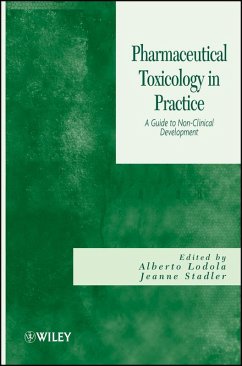
Comparative Pathophysiology and Toxicology of Cyclooxygenases (eBook, ePUB)
Versandkostenfrei!
Sofort per Download lieferbar
132,99 €
inkl. MwSt.
Weitere Ausgaben:

PAYBACK Punkte
0 °P sammeln!
The first thorough review of cyclooxygenase inhibitors, including their toxicity mechanisms and toxicopathological risks Cyclooxygenases (COXs) are enzymes responsible for the formation of an important class of biological mediators called prostanoids. Prostanoids such as prostaglandins mediate inflammatory and anaphylactic reactions. For those suffering from inflammation and pain, the pharmacological inhibition of COXs, with non-steroidal anti-inflammatory drugs (NSAIDs), such as ibuprofen, can provide relief. Yet the use of NSAIDs can trigger toxicological effects as well, leading to potentia...
The first thorough review of cyclooxygenase inhibitors, including their toxicity mechanisms and toxicopathological risks Cyclooxygenases (COXs) are enzymes responsible for the formation of an important class of biological mediators called prostanoids. Prostanoids such as prostaglandins mediate inflammatory and anaphylactic reactions. For those suffering from inflammation and pain, the pharmacological inhibition of COXs, with non-steroidal anti-inflammatory drugs (NSAIDs), such as ibuprofen, can provide relief. Yet the use of NSAIDs can trigger toxicological effects as well, leading to potential health risks. Comparative Pathophysiology and Toxicology of Cyclooxygenases provides a comprehensive overview of how COX inhibitors affect various bodily systems, specifically the toxicity mechanisms triggered when the COX enzyme is inhibited. The book provides an introduction to the discovery of cyclooxygenases, their use as therapeutic agents, as well as an historical perspective. Shedding light on the differences in expression, pathophysiology, and toxicology of COX inhibitors across species, the book offers a systematic examination of the effects and pathophysiology of COX inhibitors and their mechanisms of toxicity, beginning with the GI tract. Subsequent chapters cover: The pathophysiology of COX inhibition on bone, tendon, and ligament healing COX inhibitors and renal system pathophysiology and mechanisms of toxicity The pathophysiologic role of COX inhibition in the ocular system COX inhibition and the respiratory and cardiovascular systems The book also sheds light on the latest research devoted to developing COX inhibitors with no adverse side-effects. The first book to offer a thorough comparative look at the toxicological effects of COX inhibitors throughout the body, this invaluable resource will help advance the research and development of safer and more effective COX drugs.
Dieser Download kann aus rechtlichen Gründen nur mit Rechnungsadresse in A, B, BG, CY, CZ, D, DK, EW, E, FIN, F, GR, HR, H, IRL, I, LT, L, LR, M, NL, PL, P, R, S, SLO, SK ausgeliefert werden.












